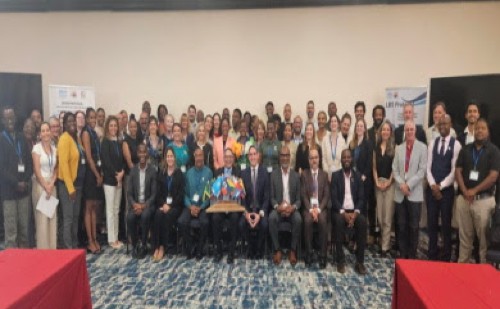LAC Adopt Landmark Action Plan For Blue Economy Resilience
KINGSTON, Jamaica – Latin America and Caribbean (LAC) countries have adopted a decisive new strategic roadmap and workplan aimed at protecting the Caribbean Sea, the economic lifeblood of the region from the compounding threats of marine pollution and marine biodiversity loss.
 COP 18 delegatesThe plan was adopted at the just concluded 18th Meeting of the Contracting Parties (COP18) to the Cartagena Convention that had been hosted by the Jamaica government and the United Nations Environment Programme (UNEP) Cartagena Convention Secretariat with the significant support of the EU ACP MEA III Programme.
COP 18 delegatesThe plan was adopted at the just concluded 18th Meeting of the Contracting Parties (COP18) to the Cartagena Convention that had been hosted by the Jamaica government and the United Nations Environment Programme (UNEP) Cartagena Convention Secretariat with the significant support of the EU ACP MEA III Programme.
The organisers have described the meeting as “a major milestone” saying it marked the first time that all three major Intergovernmental Meetings of the Cartagena Convention and Oil Spills Protocol, the Land-Based Sources of Marine Pollution (LBS) Protocol, and the Specially Protected Areas and Wildlife (SPAW) Protocol convened concurrently.
Over 80 delegates, representing Contracting and Non-Contracting Parties, and observers drawn from international and regional organizations and civil society, and youth attended the hybrid summit, underscoring the broad regional and global commitment to the health of the Caribbean Sea.
The overarching outcome of COP18 was the approval of a robust workplan and budget for the 2026-2027 Biennium, providing the financial and strategic framework necessary to operationalize key environmental commitments.
The organisers said that this blueprint directly supports the region’s collective vision for a resilient and sustainable Blue Economy, which relies fundamentally on healthy marine and coastal ecosystems to drive the tourism, fisheries, and shipping sectors.
“The decisions taken in Kingston are not merely environmental mandates; they are investments in our regional economic resilience,” said Christopher Corbin, coordinator of the UNEP Cartagena Convention Secretariat.
“We confronted some of the region’s most pressing issues impacting the Caribbean Sea, pollution, degradation of coastal and marine habits, loss of marine biodiversity, and sargassum , head-on, agreeing on a collaborative, sustainable financed strategy that translates regional commitments into tangible national actions.
“COP18 was a critical call to accelerate implementation and ensure the Caribbean Sea remains productive and prosperous for future generations,” Corbin added.
Among the key decisions taken at the conference is the “Tide on Pollution: Cleaner Lands for a Healthier Ocean (LBS Protocol),” tackling the visible and costly crisis of marine pollution,with Contracting Parties advancing the Regional Action Plan for Marine Litter and strengthened commitments under the LBS Protocol.
Delegates also reaffirmed their commitment to tackling solid waste and plastic pollution, emphasizing the transition to Circular Economy approaches.
New guidelines and financing mechanisms will be explored to help Caribbean islands and continental countries of Central and South America reduce plastic leakage into the ocean, which directly protects tourism-critical beaches and fisheries.
In addition, the parties agreed to bolster measures to control pollution from land-based They said this is vital for improving water quality, which in turn safeguards the health of the region’s rapidly disappearing coral reefs.
The meeting of the SPAW Protocol saw renewed political commitment to protecting the region’s threatened marine biodiversity.
The COP agreed on proposals to enhance and expand the region’s Managers Network of Specially Protected Areas and Wildlife, ensuring critical habitats like coral reefs, mangroves, and seagrass beds—which serve as essential natural flood defences—receive necessary protection and management.
Notably it approved the proposal from the Kingdom of the Netherlands to include Parke Marino Aruba in the SPAW List of Protected Areas.
Regarding the Sargassum problem, a united Caribbean approach had been accepted with delegates recognizing the massive influxes of Sargassum seaweed as a major threat to coastal economies and public health.
The COP approved an Action Plan and Guidelines for Sargassum Management ensuring alignment with activities under SPAW and LBS Protocols.
“This decisive commitment provides a coordinated regional approach for monitoring, early warning systems, and, crucially, exploring the sustainable reuse and value-chain development of the seaweed.”
Delegates also endorsed the objectives of the Knowledge Management and Communications Strategy to ensure that scientific data and best practices are effectively translated and shared with policymakers, local communities, and the wider public, strengthening awareness and public support for conservation efforts and to further drive resource mobilization efforts.


